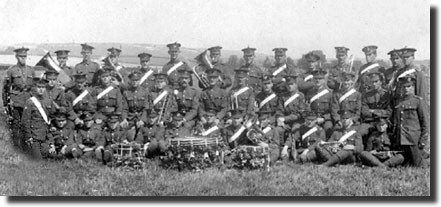|

Members
of the Second Battalion Hampshire Regiment Band pictured a
few months before seven of their number perished
in a bomb and gun attack at Youghal.
On May 31 1921, ‘X’ Company of the
Second Hampshire Regiment, under Captain C.H. Fowler, M.C., set off for Lewis gun practice
at their
firing range at Youghal in east Cork. They were accompanied by the regimental
band. The usual security precautions were taken by the British. The party was
preceded by a strong advanced guard with flankers thrown back on either side
and followed by a strong rearguard with flankers thrown forward.
About
half a mile from the range the road passed through a glen. On the left, the
ground rose immediately above the road for about fifty feet, while on the right
hand side the road was bounded by a low stone and mortar wall. Behind the wall
a small stream flowed through boggy ground and beyond this again the ground
rose steeply to about the same height as on the left side of the road. Along
this bank a wire connecting a battery to a landmine was laid by members of the
First Battalion of the IRA. The mine apparently was a large calibre shell
filled with high explosive and was placed against the masonry wall and covered
with loose stones. After placing the mine, the volunteers lay hidden in the
undergrowth waiting for the arrival of the soldiers.
The
soldiers guarding the right flank passed quite close to the battery, which was
some sixty yards from the road, but did not notice the connecting wire. Almost
immediately afterwards the column, led by the band, arrived opposite the mine.
As they passed the mine was detonated and simultaneously rapid rifle fire was
directed at them. Even though the masonry wall had to some extent diverted the
force of the blast backwards the results were devastating. The band members
bore the full brunt of the explosion with three being killed instantantly.
Although the ambushers were seen by the
British flankers on the left, who returned fire, they escaped without suffering
any casualties.
Within
an hour the casualties had been moved to the workhouse hospital in Youghal.
They were later transferred by train to the military hospital in Cork
city, but by that time four others had died of their wounds. A military funeral
was held in Cork on
the afternoon of the June 3rd, when the bodies of the seven were escorted to a
boat for England by
W Company Hampshire Regiment, together with a Company of the RIC and a band
from the 2nd. Battalion, South Staffordshire Regiment.
|
